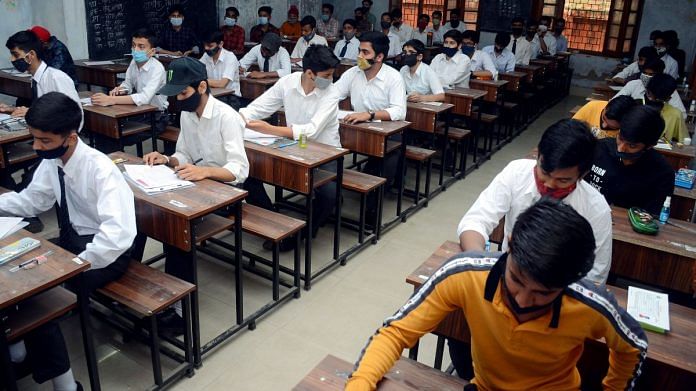The Central Board of Secondary Education released its date sheet for this year’s Class X and XII board exams on 29 December 2022. Simultaneously, Reddit saw an upswing in the number of posts by students on the subreddit handle r/CBSE. ‘Will these types of questions come?’ ‘Do people fail in class XI or is it just a hoax?’ ‘Can an experienced person share tips?’ ‘Which stream will be okay?’ ‘Class XII: Super useful trick to solve Integration by parts’ ‘Taking a drop from XII’ — read some posts.
A meme captioned ‘studying is not that difficult’ graces the front page of the post. It follows a screenshot of Christian Bale from the 2002 movie American Psycho, the word ‘chemistry’ slapped across the photo. Of the five rules of posting on the subreddit, the last plainly states – No suicide jokes, even if they are sarcastic.
But reality hits hard. Data published by the National Crime Records Bureau (NCRB) shows that more than 14,000 students in India have committed suicide since 2016 after failing an exam. Of these, 55 per cent were under 18 years of age. The current education system, particularly board examinations, has normalised stress and anxiety among students. There is a need for systemic reforms to move toward a more inclusive and less stress-inducing education system.
The ‘Sharma ji ka beta’ syndrome bites us all. What one child does, another does better. Some even say we have ushered into the era of drone parenting. The coaching culture promises to turn children into toppers. The fear of failure, not fulfilling parental and societal expectations, getting an unwanted stream, or being unable to build a career of status and a life of plenty strip away any joy of learning.
Also read: ‘How to study over how to score’ — why more Indian parents are choosing foreign school boards
Just look at the data
National Council of Educational Research and Training (NCERT) recently conducted a mental health and well-being survey of 3.8 lakh students from Class IX-XII across India. The results showed that 55 per cent of secondary school students cited studies as the main cause of anxiety, and 42 per cent worry about their future. Many students feel exhausted, low on energy, lonely, and tearful at least 2-3 times a week. During Covid, 7 per cent (26,589) students engaged in self-harm — a staggering number. Some even had panic attacks — 7,597 of them. Eleven students who identified as the third gender expressed that they would not be “respected’ if they did not do well in studies. The situation worsens as students transition from middle to secondary school.
This normalisation of stress and anxiety has made us impervious to the toll on students’ health. Student life has become synonymous with finding stress mitigation techniques. Nuggets of wisdom and advisories from all sorts of experts with good intentions keep pouring in. Board members space out examination dates so that students don’t feel overwhelmed. But is that enough? The curriculum, teaching-learning methodology, and the nature and system of board examinations remain largely unchanged.
Education policies have called for systemic reforms in board examinations for decades now. The 1993 Learning Without Burden report by Yashpal Committee gave us the metaphor of the heavy schoolbag that crushes many students. The 2005 National Curriculum Framework lamented the disconnect between school and life outside it and how students are forced to pass exams by mechanical rote memorisation. Both documents held the board examinations implicit in perpetuating inequity by placing students from economically and socially backward backgrounds at a serious disadvantage. Students with disabilities have always drawn the short end of the stick in an education system that thrives on exclusion.
Also read: India’s school education now has three class layers. Blame political meddling in syllabus
Way forward
Does it mean that we do away with board examinations? The class X and XII board exams are here to stay. Testing core capacities or competencies is a paradigm shift in assessment expressed in the National Education Policy (NEP) 2020. Teachers and eduactors need to frame fair and doable questions. A desirable washback effect on curriculum and pedagogy must take place in the form of reducing the syllabi in subjects and producing quality teaching and learning material that aligns with the diverse backgrounds of students. There are particular ways in which syllabi have been designed, whether centrally or locally, where students from non-dominant backgrounds/circumstances find no representation. Their stories, pictures, beliefs, values, food, clothing, language, histories, challenges, and achievements are either unrepresented or shown with a sense of ‘otherness’.
Teachers must undergo continuous professional development programmes. In the long run, the NEP’s recommendations of providing students with the choice of an improvement exam, offering subjects at two levels, greater choice and flexibility in subjects, and developing annual/semester exams must be explored. Accommodations for students with disabilities in school exit exams across the globe must be closely studied for moving toward inclusivity.
Rima Kaur is a part of the School of Continuing Education and University Resource centre, Azim Premji University. Views are personal.
(Edited by Humra Laeeq)



